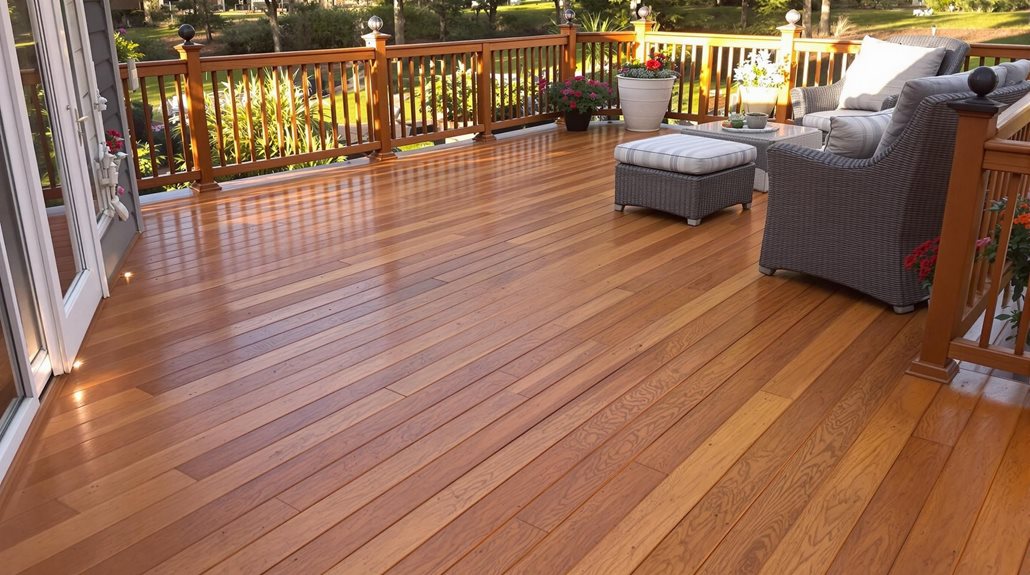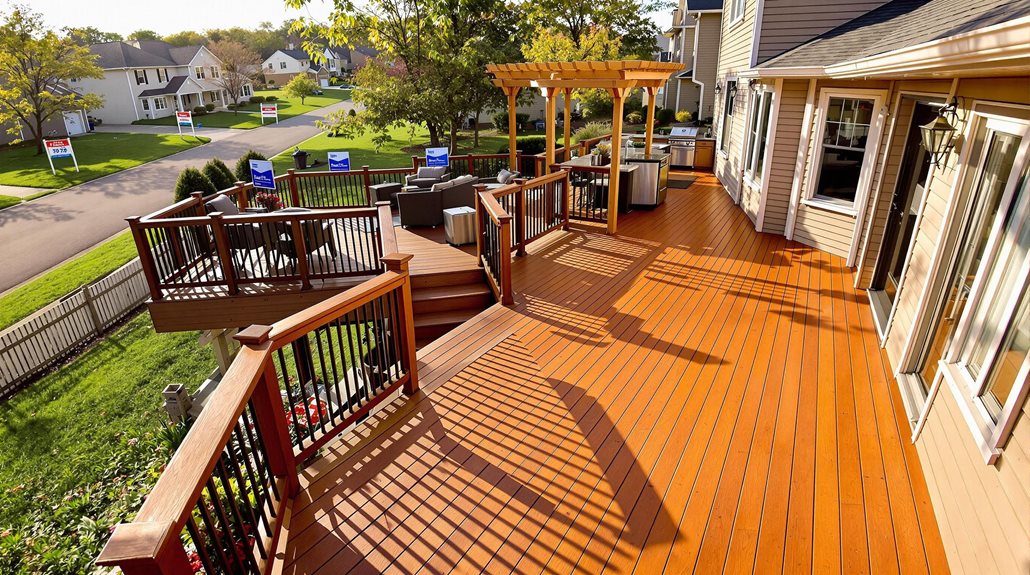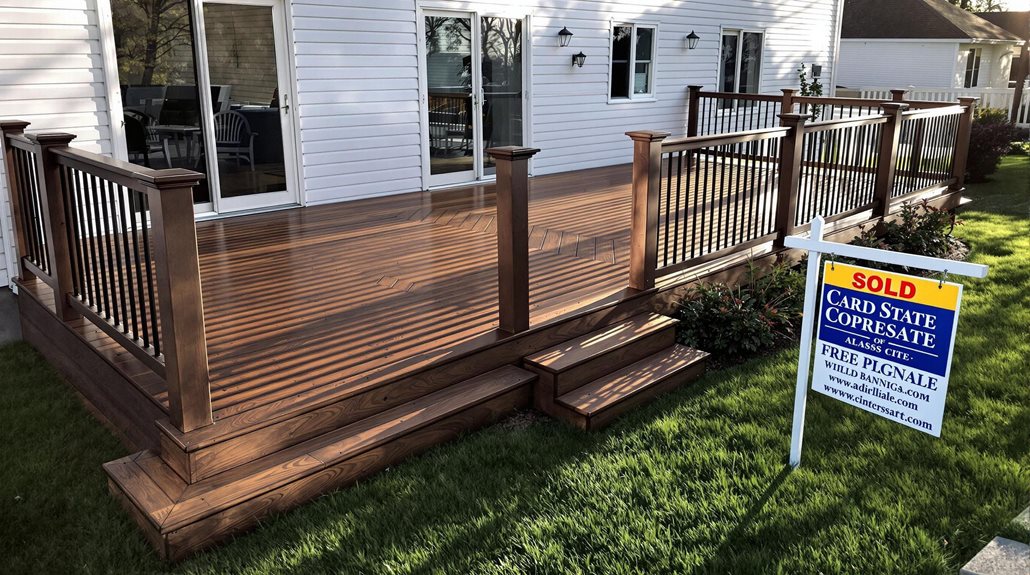Do Decks Increase Property Value?
Decks can greatly increase property value by enhancing outdoor living spaces and appealing to potential buyers. The type of materials used, such as hardwood, composite, or pressure-treated wood, influences this value. Well-maintained decks with built-in amenities like seating and lighting also boost attractiveness. Local market trends and the cost versus return on investment play vital roles. For maximum impact, thoughtful design and durable materials are key. Further details on how decks enhance property value can be found in the following sections.
Expert Highlights
- Decks can significantly increase property value, especially when made from preferred materials like hardwood, composite, or pressure-treated wood.
- Well-designed and well-maintained decks enhance outdoor living and appeal to potential buyers, boosting property value.
- Built-in amenities such as seating, lighting, and other features increase the attractiveness and value of a deck.
- Routine maintenance and ensuring structural integrity are crucial for retaining the value added by a deck.
- Local market trends play a significant role in determining how much a deck can increase property value.
The Impact of Deck Type on Property Value

How substantially does the type of deck impact property value? The answer lies in the materials and design chosen. Decks made from high-quality, durable materials such as hardwood, composite, or pressure-treated wood generally increase property value more markedly than those made from lower-grade materials.
A well-designed deck that complements the architectural style of the house and enhances outdoor living spaces can also boost property value. For instance, a deck with built-in seating, lighting, and other amenities can appeal to potential buyers who value outdoor living.
Additionally, decks that are well-maintained and show signs of careful craftsmanship can further enhance the perceived value of a property. Ultimately, the type of deck can markedly influence how attractive and valuable a property appears to potential buyers. Working with experts who focus on custom solutions ensures your deck investment maximizes both functionality and property value enhancement.
Condition and Maintenance of Decks

The condition and maintenance of a deck play a essential role in determining its impact on property value. A well-maintained deck can greatly enhance the appeal and value of a property, while a neglected or dilapidated one can detract from it.
Regular maintenance tasks such as cleaning, staining, and repairing damaged boards are key to keeping the deck in good condition. Additionally, ensuring that the deck is structurally sound and compliant with safety standards is necessary.
Potential buyers often view a well-maintained deck as an attractive feature that adds to the overall livability and enjoyment of the property, thereby increasing its value. Conversely, a poorly maintained deck can raise concerns about upkeep costs and safety, potentially lowering the property's value.
Using composite decking materials can significantly reduce long-term maintenance requirements while resisting common issues like fading, staining, and mold growth.
Local Market Trends and Deck Value

Local market trends greatly influence the impact of a deck on property value.
In areas where outdoor living is highly valued, such as coastal or suburban regions with pleasant climates, decks can markedly enhance property appeal and value. Homebuyers in these markets often look for homes with well-maintained outdoor spaces that offer expansive views or seamless connections between indoor and outdoor living areas.
In contrast, in urban areas where space is limited and outdoor living may not be as prioritized, the addition of a deck might not have the same level of impact on property value.
Understanding local preferences and trends is essential for homeowners looking to maximize their investment in a deck. Tailoring the design and features of the deck to what local buyers desire can make it a valuable selling point.
Investing in composite deck materials can provide long-term value through enhanced durability and minimal maintenance requirements.
Cost vs. Return on Investment for Decks

When considering the addition of a deck to a property, one of the key factors to evaluate is the cost versus the return on investment. The cost of building a deck can vary widely depending on materials, size, and complexity.
On average, a deck can cost anywhere from $3,000 to $10,000 or more.
In terms of return on investment, decks generally offer a moderate to high return. According to the National Association of Realtors, a deck can recoup around 80% of its cost at resale.
This makes it a worthwhile investment for homeowners looking to enhance their property's value and appeal. However, the exact return depends on local market trends and the quality of the deck construction.
A well-designed and well-built deck can considerably boost a property's value and attract potential buyers.
Custom deck design specialists can help maximize your investment by creating layouts that perfectly complement your home's architecture.
Design and Features That Enhance Value

Design and features play a major role in enhancing the value of a deck. A well-designed deck can seamlessly integrate with the exterior of a home, creating a cohesive and inviting outdoor space.
Features such as built-in seating, planters, and lighting can add functionality and aesthetic appeal. The choice of materials, including hardwoods like cedar or ipe, can also impact value due to their durability and attractive appearance.
Additionally, incorporating elements like fireplaces, outdoor kitchens, or pergolas can greatly increase the deck's appeal and functionality, making it a desirable feature for potential buyers.
These thoughtful design choices can turn a deck into an extension of the living space, thereby enhancing property value.
Composite materials have become increasingly popular for their low maintenance requirements and long-lasting durability in outdoor environments.
Frequently Asked Questions
How Do Decks Affect Property Taxes?
Decks can increase property taxes because they are considered an improvement to the property, potentially raising its assessed value. This higher assessment may lead to increased tax liability, reflecting the enhanced property value.
Can Decks Be Included in Home Appraisals?
Decks can indeed be included in home appraisals, as they are considered a valuable addition to the property. Appraisers evaluate the deck's condition, size, and quality to determine its impact on the overall property value.
Do Decks Impact Homeowner Insurance Rates?
Decks can impact homeowner insurance rates, as they may increase the overall value of the property and potentially raise replacement costs in the event of damage or destruction. Insurance companies consider these factors when determining premiums.
Are There Any Local Regulations for Deck Construction?
Local regulations for deck construction often include building codes, zoning laws, and permits required to guarantee safety and compliance with community standards. These regulations vary by jurisdiction and may involve inspections and approval processes.
Can a Deck Increase Property Value in Urban Areas?
In urban areas, a well-designed and constructed deck can considerably enhance property value by providing additional living space, improving aesthetics, and offering a desirable outdoor lifestyle that appeals to potential buyers.
Expert Final Thougts
Decks can indeed increase property value, but their impact depends on several factors. The type of deck, its condition and maintenance, and local market trends all play significant roles. While the cost of installing a deck must be weighed against potential returns, well-designed and feature-rich decks can enhance both the aesthetic appeal and functionality of a property, ultimately boosting its value. Properly integrated decks can make a property more attractive to potential buyers.






